Dental Implants: Smile Confidently for Life

Dental implants are small, screw-like posts made of titanium that are surgically placed into the jawbone to replace missing teeth. They act as artificial tooth roots, providing a strong foundation for supporting crowns, bridges, or dentures.
Purpose of dental implants:
Dental implants serve a multitude of purposes, going beyond just replacing missing teeth. Here’s a breakdown of their key goals:
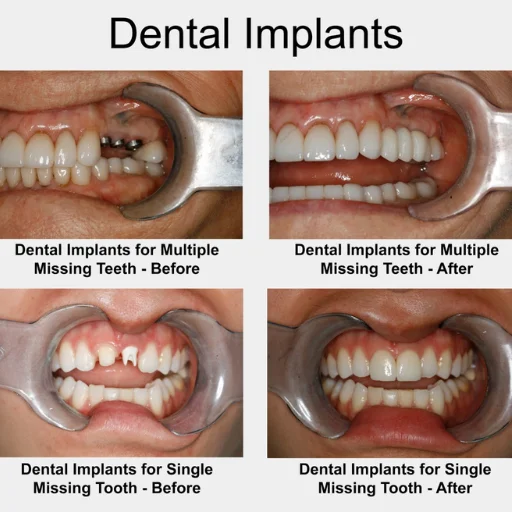
1. Restore Function:
- Eating and Chewing: Missing teeth make it difficult to enjoy various foods and chew efficiently. Implants act like natural tooth roots, anchoring crowns or dentures that restore chewing function and let you bite into your favorite foods with confidence.
- Speaking Clearly: Gaps in your smile can impact speech, causing lisps or slurred pronunciation. Implants fill these gaps, providing a solid foundation for your teeth and improving your speech clarity.
2. Enhance Appearance:
- Natural-Looking Smile: Implants closely resemble natural teeth in both look and feel. Crowns placed on implants are custom-made to match the color and shape of your existing teeth, giving you a natural and beautiful smile.
- Boosted Confidence: A complete, confident smile can significantly impact your self-esteem and social interactions. Implants help you regain your confidence and smile freely without worrying about missing teeth.
3. Preserve Oral Health:
- Prevent Bone Loss: Missing teeth lead to jawbone deterioration over time. Implants stimulate bone growth and prevent this bone loss, maintaining the health and structure of your jaw.
- Protect Neighboring Teeth: Traditional bridges for missing teeth often require grinding down healthy adjacent teeth. Implants eliminate this need, preserving the health and structure of your remaining teeth.
4. Long-Term Benefits:
- Durability: Dental implants are made of biocompatible titanium, making them incredibly strong and durable. They can last for decades, even a lifetime with proper care, unlike traditional dentures or bridges that require replacements over time.
- Convenience: Unlike dentures that need to be removed for cleaning, implants function like natural teeth and require no special maintenance beyond regular brushing and flossing.
Overall, dental implants offer a comprehensive solution for restoring both the function and aesthetics of your smile, while promoting long-term oral health. If you’re considering replacing missing teeth, consult with a qualified dentist to discuss whether implants are the right choice for you.
Types of Dental Implants: Choosing the Right Option for You
Dental implants offer a life-changing solution for replacing missing teeth, restoring both function and aesthetics. But with different types available, choosing the right one can be confusing. Here’s a breakdown of the most common types to help you understand their strengths and suitability:

1. Endosteal Implants:
- Most common type: Representing over 90% of placed implants, these are screwed directly into the jawbone, mimicking natural tooth roots.
- Strong and durable: Ideal for long-term stability and supporting various restorations like crowns, bridges, or dentures.
- Requires sufficient jawbone: Not suitable for individuals with significant bone loss, requiring bone grafting procedures beforehand.
2. Subperiosteal Implants:
- Alternative for minimal jawbone: Placed on top of the jawbone rather than inside it, making them suitable for patients with bone loss.
- Less invasive surgery: Generally simpler and quicker procedure compared to endosteal implants.
- Limited restoration options: Primarily used for supporting dentures, not ideal for single tooth replacements.
3. Zygomatic Implants:
- Anchored in cheekbone: Used when the jawbone is severely compromised and traditional implants aren’t feasible.
- Complex procedure: Requires specialized skills and expertise due to the delicate nature of the cheekbone.
- Immediate loading possible: In some cases, restorations can be attached soon after placement, unlike other types.
4. Mini Implants:
- Smaller diameter: Used for situations where space is limited, like narrow jaws or replacing front teeth.
- Less invasive: Simpler procedure with faster healing times compared to standard implants.
- Limited bite force: Not suitable for heavy chewing or replacing molars due to their smaller size.
Choosing the Right Implant:
The best type for you depends on various factors like:
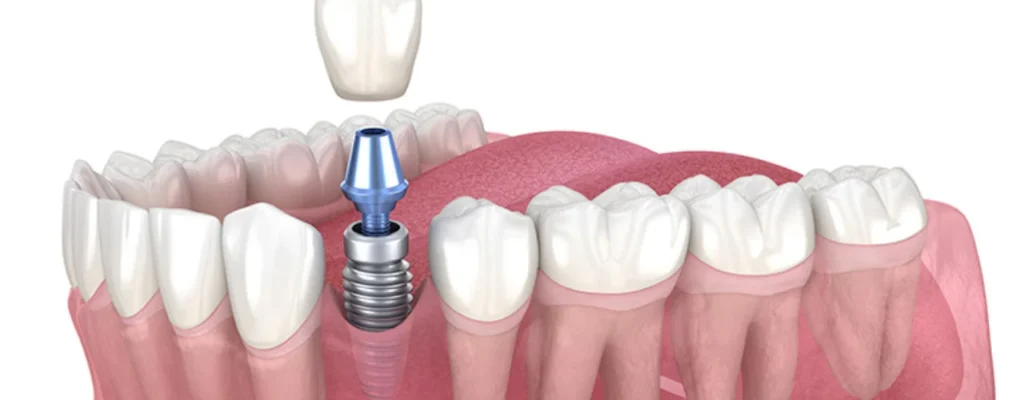
- Jawbone health and quantity
- Number of missing teeth
- Desired restoration type (crown, bridge, denture)
- Overall health and medical history
- Budget and insurance coverage
It’s crucial to consult with a qualified dentist or oral surgeon who can assess your individual needs and recommend the most suitable type of implant for your situation. They can also discuss specific advantages and disadvantages of each option in detail, enabling you to make an informed decision.
Procedure:
Dental implant surgery is typically performed by an oral surgeon or a periodontist. The process involves several steps:
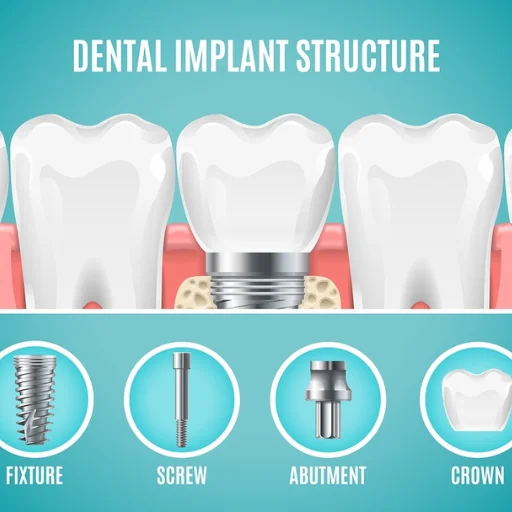
- Consultation and planning: Your dentist will discuss your medical history, examine your teeth and jawbone, and take X-rays to determine if you are a good candidate for implants.
- Placement of the implant: The surgeon will make a small incision in the gum tissue to expose the jawbone. A small hole will then be drilled into the bone, and the implant will be screwed into place.
- Osseointegration: After the implant is placed, it takes several months for the bone to grow around and fuse with the implant, a process called osseointegration.
- Abutment attachment: Once osseointegration is complete, the surgeon will attach a small piece called an abutment to the implant. The abutment acts as a connector between the implant and the restoration.
- Crown or restoration placement: The final step is to place a crown, bridge, or denture on the abutment. The restoration will be custom-made to match your natural teeth in color, size, and shape.
The Lifespan of Dental Implants:
Dental implants are known for their longevity, surpassing other tooth replacement options. However, their lifespan can vary depending on several factors. Here’s a breakdown:
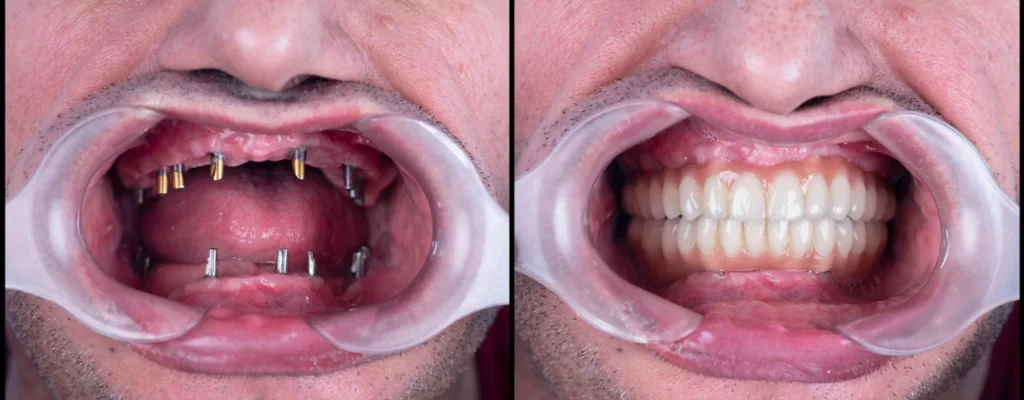
Average Lifespan:
- Most dental implants boast a success rate of over 90% after 10 years, meaning they remain functional and stable.
- Studies have shown implants lasting over 30 years with proper care, potentially achieving a lifetime duration for many individuals.
Factors Affecting Lifespan:
- Jawbone health: Strong, healthy jawbone provides a solid foundation for implant stability. Bone loss can compromise longevity.
- Implant material: Titanium, the most common material, is highly biocompatible and resistant to wear and tear.
- Surgical technique: Precise placement and good surgical technique ensure proper integration with the jawbone.
- Oral hygiene: Regular brushing and flossing around implants prevent bacterial build-up and gum disease, which can lead to implant failure.
- Lifestyle habits: Bruxism (teeth grinding) and smoking can increase stress on implants, affecting their lifespan.
Crown or restoration lifespan:
It’s important to note that while the implant itself can last a lifetime, the crown or restoration placed on top may need replacement every 10-15 years due to normal wear and tear.
Tips for maximizing lifespan:
- Maintain good oral hygiene by brushing and flossing regularly.
- Visit your dentist for regular check-ups and cleanings.
- Avoid smoking and excessive alcohol consumption.
- Wear a mouth guard if you grind your teeth at night.
- Address any oral health concerns promptly.
Remember, consulting with a qualified dentist is essential for determining the expected lifespan of your specific implants based on your individual factors and ensuring their long-term success.
Risk and complications:
Dental implants, while undeniably beneficial, aren’t without their potential risks and complications. Here’s a breakdown of what you should be aware of:
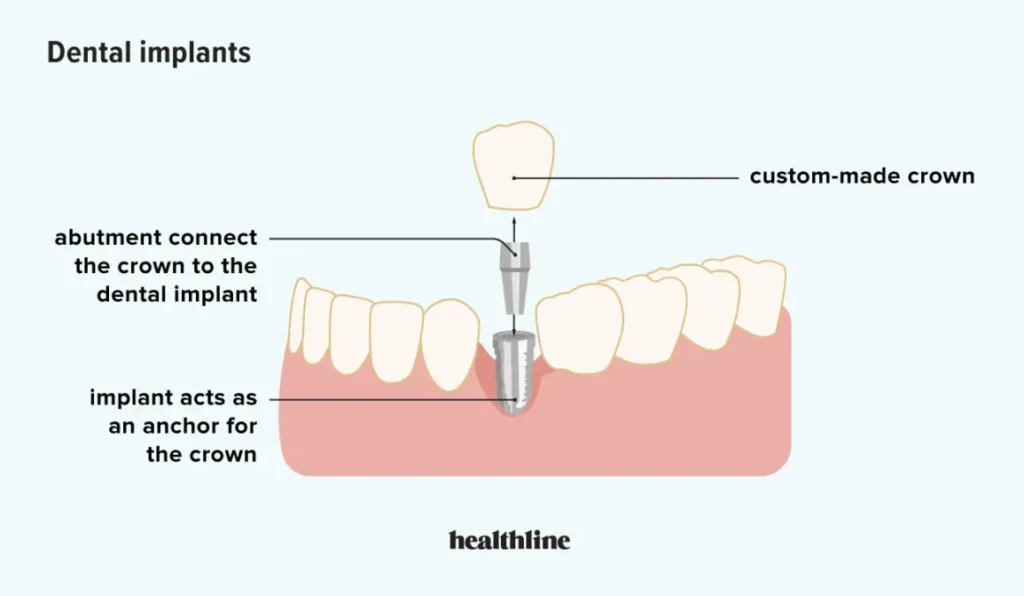
Short-term Risks:
- Infection: As with any surgery, there’s a risk of infection around the implant site. Careful oral hygiene and following your dentist’s instructions can significantly reduce this risk.
- Bleeding and swelling: Mild bleeding and swelling after surgery are expected and typically subside within a few days.
- Pain: Pain after the procedure is normal and can be managed with medication.
- Temporary numbness or tingling: Damage to nerves during surgery can lead to temporary numbness or tingling in the surrounding area. This usually resolves within weeks or months.
Long-term Complications:
- Implant failure: While rare, implants can fail to fuse with the jawbone (osseointegration). This can necessitate removal and potentially bone grafting before re-implantation.
- Peri-implantitis: Similar to gum disease, peri-implantitis is an inflammation around the implant that can damage the surrounding bone and tissue. Good oral hygiene is crucial to prevent this.
- Sinus problems: Implants placed in the upper jaw can sometimes perforate the sinus membrane, leading to discomfort and potential infections.
- Nerve damage: Though uncommon, nerve damage during surgery can cause permanent numbness or tingling in the affected area.
- Crown or restoration issues: The crown or restoration placed on the implant can loosen, chip, or fracture over time and may need replacement.
Factors that Increase Risk:
- Smoking: Smoking significantly increases the risk of implant failure and peri-implantitis.
- Poor oral hygiene: Neglecting good oral hygiene after implant placement puts you at higher risk of infections and peri-implantitis.
- Underlying medical conditions: Certain medical conditions like diabetes or uncontrolled chronic diseases can increase the risk of complications.
- Bone health: Individuals with low bone density or severe bone loss may require bone grafting procedures before implant placement.
Minimizing the Risks:
- Choosing a qualified dentist: Consulting an experienced and qualified dentist with expertise in implant procedures is crucial.
- Following pre-operative instructions: Strictly adhere to your dentist’s recommendations before surgery, such as quitting smoking or adjusting medications.
- Maintaining good oral hygiene: Following proper brushing and flossing routines around the implants is essential for long-term success.
- Regular dental checkups: Regular visits to your dentist for cleanings and checkups help monitor the health of your implants and detect any potential issues early.
By being aware of the risks and taking necessary precautions, you can maximize the success of your dental implant treatment and enjoy the benefits of a beautiful, functional smile for years to come.
Cost of dental implants:
Dental implants are more expensive than traditional dentures or bridges. However, the long-term cost of implants may be lower, as they typically last much longer and require less maintenance.
If you are considering dental implants, it is important to consult with a qualified dentist to discuss your options and determine if this is the right treatment for you.
https://blog.derma.pk/
Final Thoughts:
Dental implants offer a life-changing solution for replacing missing teeth, boasting unparalleled benefits while presenting potential risks. Their longevity, functional restoration, improved aesthetics, and convenience make them a compelling choice for many individuals. However, careful consideration of potential risks like infection, implant failure, and peri-implantitis is crucial.
Ultimately, the decision to pursue dental implants hinges on individual needs, health conditions, and thorough consultation with a qualified dentist. By weighing the benefits and risks, maintaining good oral hygiene, and choosing a skilled professional, you can maximize the success of your treatment and reap the rewards of a confident, functional smile for years to come.
Derma and dental Clinic:
Derma & Dental Clinic stands out with its team of experienced doctors backed by scientific evidence in their chosen fields. Their diverse range of medical-grade procedures offer tailored solutions for various skin and dental needs. You can confidently book your consultation online or by phone and embark on your journey towards healthier skin and a radiant smile.
Location: Bahria Town, Lahore
Specialties: Dermatology and Dental Care
Website: derma.pk
For appointment:
- Online at Dermatology.pk
- WhatsApp: +923205999650
- Phone: 03041115000




5 thoughts on “Dental Implants: Smile Confidently for Life”
You are a very persuasive writer. I can see this in your article. You have a way of writing compelling information that sparks much interest.
I want to thank you for your assistance and this post. It’s been great.
Good web site! I truly love how it is easy on my eyes and the data are well written. I am wondering how I could be notified whenever a new post has been made. I’ve subscribed to your RSS which must do the trick! Have a nice day!
May I request that you elaborate on that? Your posts have been extremely helpful to me. Thank you!
You’ve been great to me. Thank you!